
The preparation for JEE 2026 (Main and Advanced) requires the development of strong note-making skills to improve understanding and revision of the syllabus. Effective note-taking skills allow you to learn and revise quickly without relying on the entire textbook.
In relation to the above, this blog recommends practical tips on how to make effective notes for JEE 2026 (Main and Advanced). The following are the key takeaways covered in this blog:
- JEE preparation (Main and Advanced) can be improved by focusing on speed and NCERT basics. Advanced preparation emphasises in-depth conceptual clarity, regular practice with multi-step, analytical problems, and analytical problem-solving.
- The key strategies for both exams include focusing on formulas, definitions, and writing laws. Also, use symbols and abbreviations by highlighting the important formulas with different colours.
Before moving further with the JEE Main 2026 preparation strategy, stay updated with JEE Main 2026 latest updates, exam dates and pattern.

How to Make Notes for JEE 2026: A Complete Guide for Main & Advanced Preparation
Preparation for JEE requires the development of “effective notes-making” skills. Effective notes in your own language help you remember things for a long period of time. Students can organise content with headings, bullet points, and diagrams to make their notes look clean and easy to read.
However, most of the students struggle to create their own notes. So, they prefer copying from books and other study materials, which leads to lengthy and confusing notes. This is not even helpful during revision.
Through carefully reading this blog, you will learn how to make short notes for JEE, along with some subject-wise tips and revision tips to boost your confidence and skills for the upcoming JEE exam 2026 preparation.
Step-by-Step Guide on How to Make Notes for JEE (Main and Advanced)
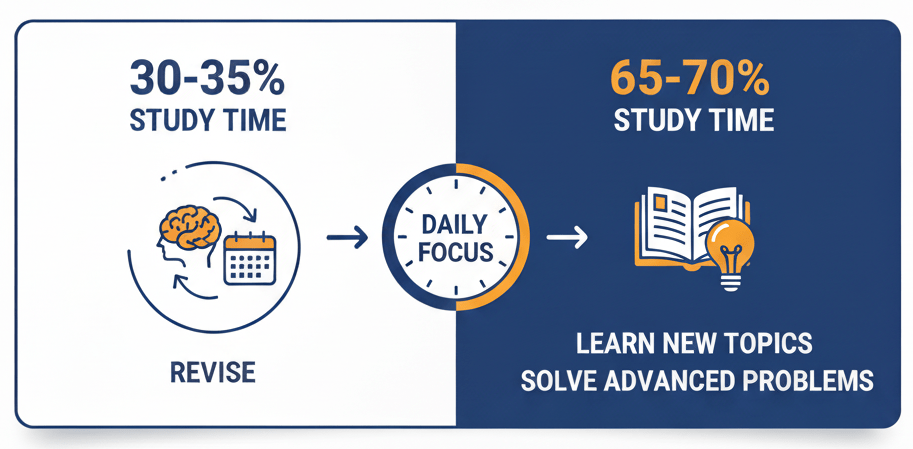
The learning process for how to make notes for JEE is successfully initiated by understanding the exam pattern and syllabus effectively. 30-35% of your study timefocuses on revising what you studied in the previous day, and 65-70% of study time should focus on learning new topics or solving advanced problems.
For aspirants who are starting their preparation early, follow this topper’s approach on how to prepare for JEE Main from class 11.
The following are the step-by-step guidelines regarding note-making for JEE (Main and Advanced):
Step 1: Always sit on a chair and table, keeping your study space clean and well-organised. You can implement the 25-5-30 study method by studying continuously for 25 minutes, then taking 5-minute breaks, and after completion of four 25-minute sessions, taking a longer break for rest.
Step 2: Focus on understanding the entire JEE syllabus thoroughly. Identify high-weightage topics such as Electrostatics, Thermodynamics, and Organic Named Reactions by setting clear priorities before you start making notes.
Step 3: You should prepare a separate section for recording the regular mistakes and tricky problems. Review them before tests and avoid repetition. This review helps you in identifying error patterns and avoiding repeating them.
Step 4: Always pay close attention in coaching classes or self-study sessions and note down tips, tricks, and shortcuts that are not mentioned in textbooks for the last-minute revision.
Step 5: You should focus on writing your own words by explaining concepts in simple and personal language so you truly understand them, rather than just memorising text from books or modules. Adding flowcharts, diagrams, reaction maps, and tables simplifies complex topics and improves memory retention.
Step 6: Spend 10–15 minutes every day revising your own notes. This simple approach helps in keeping concepts fresh by strengthening memory for exam preparation.
Why are Notes Important for JEE Preparation?
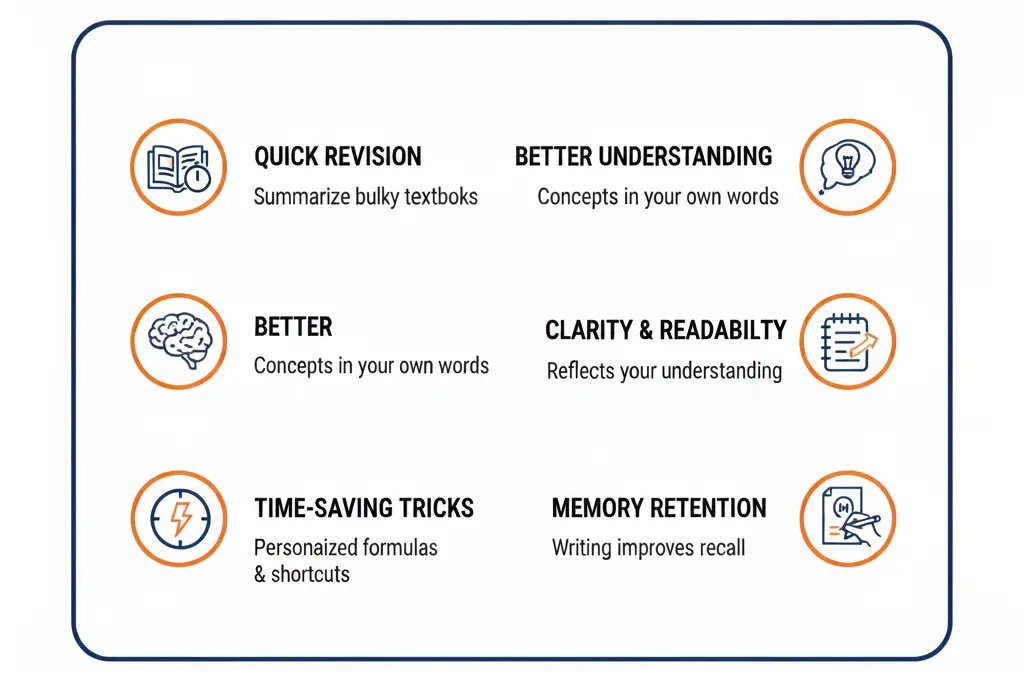
Notes are important for JEE preparation because they simplify complex concepts or topics by making the revision process faster, easier, and more effective before exams. The bullet points listed below highlight the importance of notes in JEE preparation-
- Notes support you in revising an entire topic quickly without deeply reading bulky textbooks.
- Writing study material in your own words helps in understanding and remembering concepts better.
- Effective notes clearly reflect your overall understanding by making them easier to read later.
- Using personalised tricks, formulas, and shortcuts clearly saves time during practice for JEE Main and Advanced. Writing things down improves memory and ensures concepts stay fresh for exams.
How to Make Short Notes for JEE Main 2026?
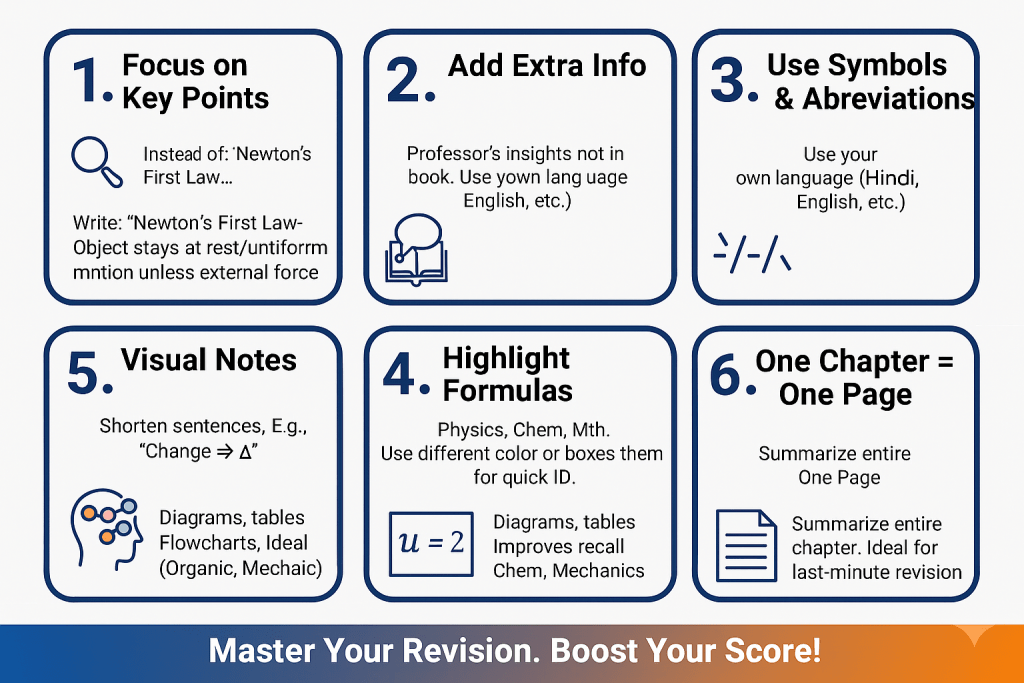
Creating short and to-the-point notes is an essential approach for JEE 2026 aspirants, because a wide range of students write their notes in lengthy paragraphs. Instead of this, writing goals should be clear, concise, and easy-to-revise notes that focus only on what truly matters. This approach negatively impacts the purpose of note-taking.
The approach to making short notes for JEE Main 2026 effectively is as follows:
1. Only focusing on key points: You should focus on writing definitions, formulas, laws and concepts that are directly linked to problem-solving, instead of copying the entire paragraph from a textbook. For example:
- Instead of writing: “According to Newton’s First Law, an object will remain at rest or in uniform motion in a straight line unless acted upon by an external force.” Write: “Newton’s First Law- Object stays at rest/uniform motion unless an external force is applied.”
2. Not repeating already mentioned points in the book: It is crucial to understand the book content, but after carefully reading it, you should also note key points, insights, and explanations shared by your professor that are not in the textbook. You should focus on writing in your own language, whether it is Hindi, English, or your native language.
3. Using Symbols and Abbreviations: It is an effective approach to always shorten long sentences by using symbols and abbreviations to make notes concise and quick to review.
4. Highlighting Important Formulas: Physics, Chemistry, and Mathematics effectively require the implementation of formulas by highlighting them using a different colour or boxing them for quick identification.
5. Keeping Notes in Visual Form: The use of diagrams, tables, and flowcharts improves the visual representation of the notes. The approach helps in quicker recall, especially in subjects like Organic Chemistry and Mechanics.
6. One Chapter = One Page (Rule): You should implement the approach of making short notes to summarise an entire chapter into one page. Summarising one topic on a separate page is an ideal approach during the last few days before the exam.
How to Make Short Notes for JEE Advanced 2026?
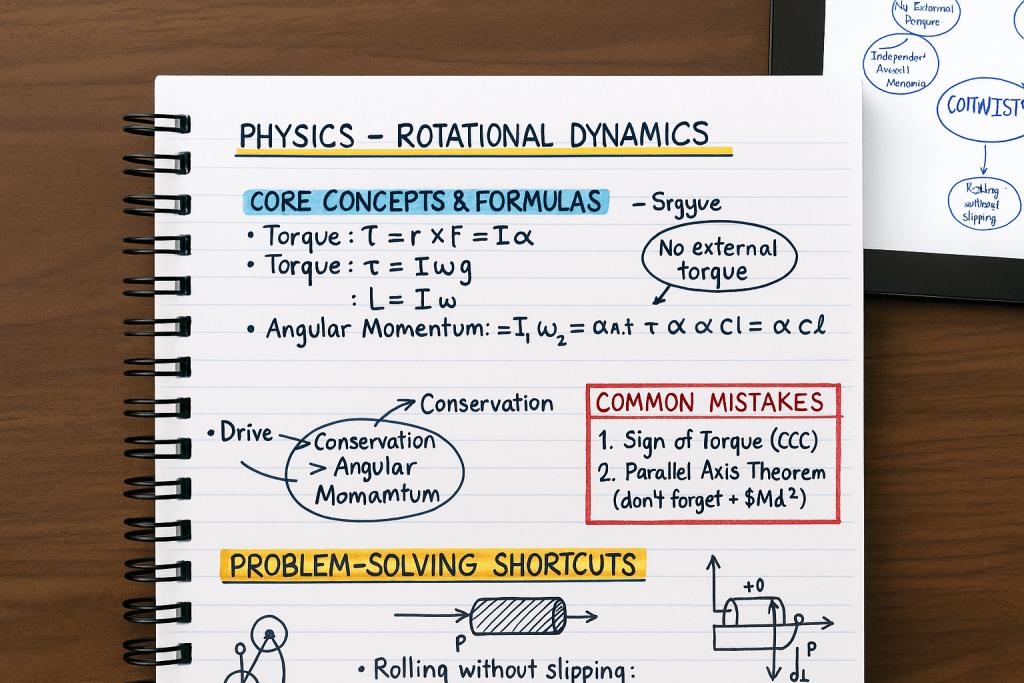
Note-making for JEE Advanced 20026 is different from JEE Main. It is because it requires deeper conceptual clarity and a more strategic approach. JEE Advanced questions are more analytical and multi-step in comparison to the Main. Therefore, your notes must be well-structured, precise, and focused on problem-solving techniques. Below are key strategies to create effective and well-structured short notes for JEE 2026 Advanced preparation.
- You should start the exam preparation as per the JEE Advanced exam format and structure. The approach helps in effectively knowing the types of questions and topics important for JEE Advanced preparation.
- Apart from the formulas, it is also important to make a separate section to note down the common mistakes identified during the studies. This personalised method helps in reducing the place for repeated errors during problem-solving in making physics short notes for JEE Advanced and mathematics short notes for JEE Advanced.
- In the process of note-taking, you should focus on highlighting the papers and concepts behind them. The process helps in making organic chemistry short notes for JEE Advanced and other subjects.
- JEE Advanced preparation can be improved with writing core concepts by storing mind maps and problem-solving shortcuts digitally for quick access at the last moments before exams.
How to Make Chemistry Notes for JEE?
JEE 2026 Chemistry has 3 major parts, such as Organic, Inorganic and Physical, where each subject requires a different not-making strategy. Properly knowing how to make chemistry notes for JEE 2026 (Main and Advanced) ensures you cover all areas effectively.
Primary tips for making chemistry notes are as follows-
For Physical Chemistry:
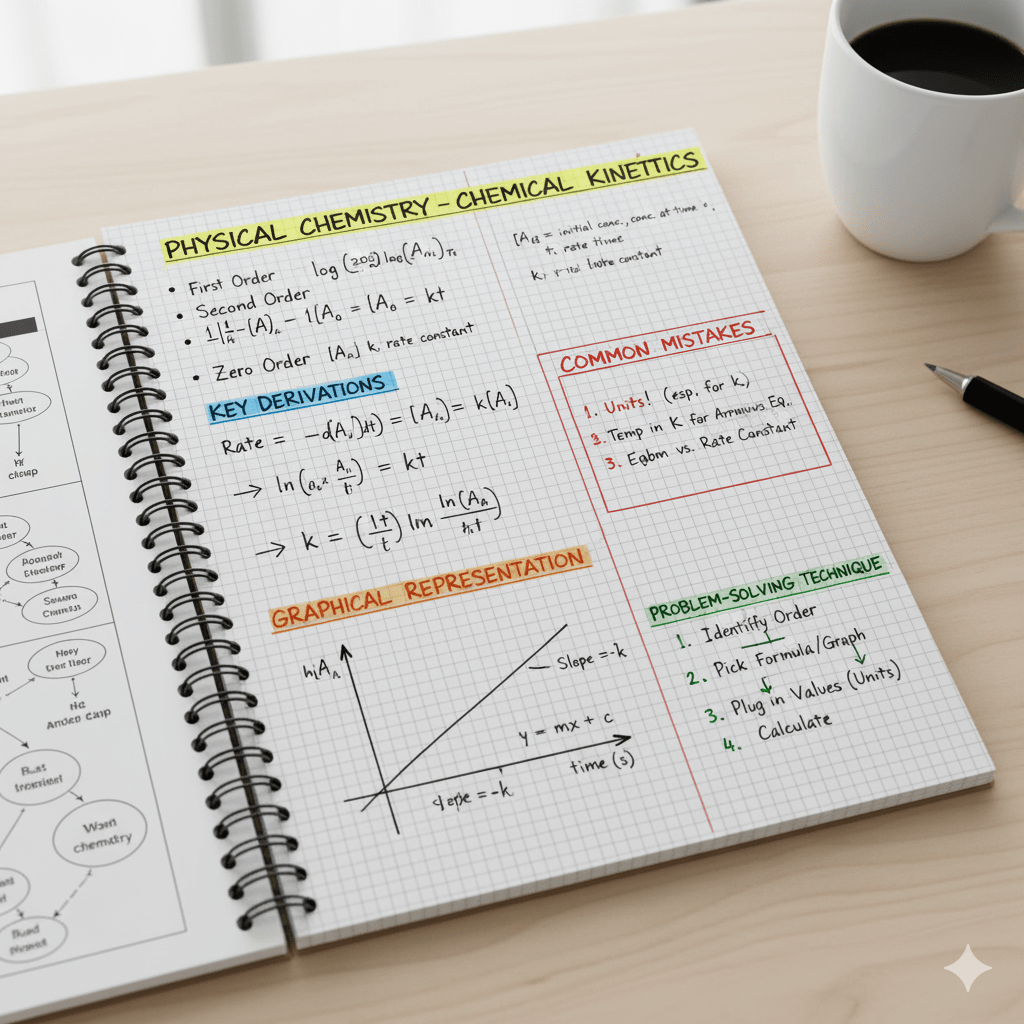
- You should focus on step-by-step formulas, laws, and solved examples.
- Always include derivations and key numerical problem-solving techniques in a concise manner.
Organic chemistry short notes for JEE:
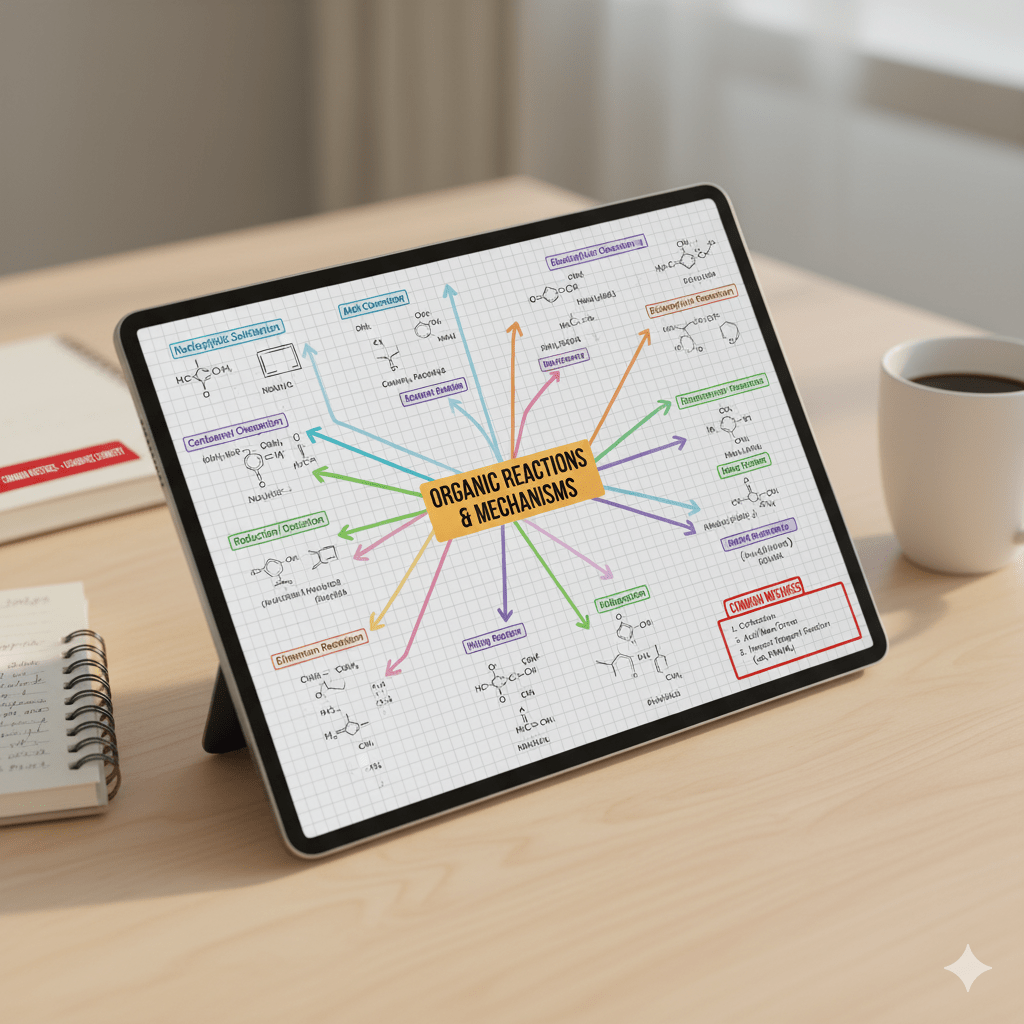
- In chemistry, one of the most crucial subjects is organic chemistry. So, the focus should be on highlighting reactions, mechanisms, and exceptions by using reaction maps and flowcharts to highlight the important parts for last-minute study.
- Highlight named reactions and key exceptions separately for last-minute revision.
For Inorganic Chemistry:
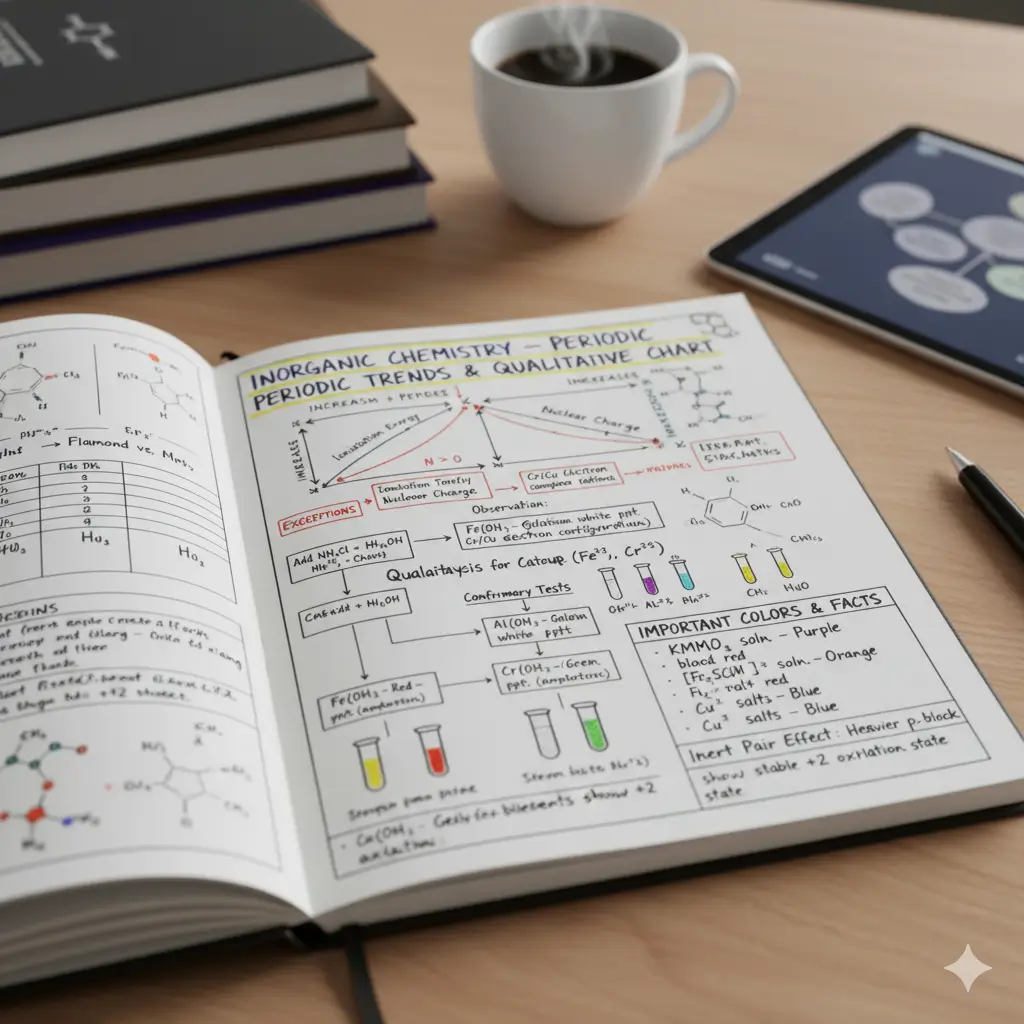
- Utilising the periodic table for organising trends, compound properties, and reaction behaviours.
- Highlighting important colours, chemical reactions, and exceptions for quick identification.
- Using charts or summary tables to make the information visually appealing and easier to retain.
Tips to Make Physics Short Notes for JEE
JEE 2026 physics effectively requires a deep understanding of formulas and scientific concepts. Effectively developing physics short notes for JEE helps you revise more effectively by improving overall accuracy. Below are essential tips to create clear and concise physics short notes for JEE 2026 preparation.
- It is an effective approach to initiate with the necessary derivations and formulas by combining important definitions and laws. For example, such as Newton’s laws or Ohm’s law, in a clearer and organised format.
- Diagrams in preparation hold an important role in studying various topics such as optics, mechanics, and electricity. This well-organised approach of short notes works as a method when some days are left before the final exam. The approach enables quick revision without requiring the study of bulky textbooks or lengthy coaching materials.
- In Physics short notes, a common component observed in all top-performing notes is the inclusion of a filtered list of the most important physics formulas for JEE Main 2026.
Also Read: Along with short notes, read the toppers startegy for how to study physics for JEE Main 2026?
Suggestions to make Mathematics Short Notes for JEE
Math clearly demands accuracy and speed, which makes the process of making mathematics short notes for JEE 2026 preparation essential. You have to initiate by collecting the various formulas. Then write according to the chapter-wise section by developing separate notebooks for each section.
Mathematical theorems and sums must be written in simple words, incorporating relevant examples to facilitate effective understanding of the solution. This can be achieved by utilising topics like Calculus, where derivatives and integrals can be clearly organised.
Download the most important mathematics formulas for JEE Main and Advanced 2026. Keep this list handy while solving numeriocals and include it in the mathematics short notes for JEE.
Tips to Make Revision Notes for JEE Main and JEE Advanced
Creating well-structured revision notes for JEE Main and Advanced helps in quick, organised last-minute preparation by ensuring better focus on high-weightage topics and efficient revision. Key tips to consider for making revision notes are as follows-
- Revision notes for JEE Main and Advanced work effectively during final exam preparation, because notes clearly include a summary of an entire topic for last-minute review.
- Revision notes should be developed by using tables, bullet points and charts for keeping the information well-organised.
- You should implement a colour coding system by highlighting the important formulas. For example, red for formulas, blue for definitions, green for diagrams and highlights for the important topics.
- Effectively developed notes save your time by focusing on preparing for high-weightage topics to get good marks in JEE 2026.
- It is essential to always update your notes regularly by using tips and strategies from educational experts to keep revision material relevant and comprehensive.
Also Read:
Are you preparing for JEE Main 2026? Read these blogs for clarity on the exam and preparation strategy:
- How to prepare for JEE Advanced 2026? Strategy, study plan and topper tips.
- How to calculate the percentile in the JEE Main exam?
- How to avoid silly mistakes in the JEE Main exam?
Conclusion
In conclusion, making effective notes for JEE 2026 (Main and Advanced) is a critical aspect during the preparation journey because well-organised and structured notes help students in creating a good understanding of the topic/subject and faster last-minute revision. The key considerations are as follows-
- JEE 2026 preparation depends on the implementation of effective strategies, such as the correct use of diagrams, abbreviations, and flowcharts to make notes more visually appealing and easy to remember.
- Students should also focus on making strategies for different subjects to ensure speed and accuracy.
- Ultimately, good notes boost confidence and improve overall performance by helping aspirants to achieve success in JEE 2026 (Main and Advanced).
FAQs:
You should start by understanding the syllabus and topics covered in JEE Main and Advanced 2026. After this, note down key concepts, definitions, and formulas in your own words by using diagrams and bullet points to keep notes clean and easy to revise quickly.
JEE Main preparation requires focus on speed, accuracy, and NCERT basics, while JEE Advanced preparation emphasises a deep understanding of the concepts, regular practice for multi-step problems, and analytical skills for improving problem-solving skills.
Short notes for JEE Main and Advanced are a concise one-page summary of any chapter or topic. You can get help by making short notes before the exams and save time by focusing on key factors such as formulas, laws, and problem-solving tricks.
You can make chemistry notes in three major parts: Physical, Organic, and Inorganic. Start with writing formulas for Physical Chemistry, reaction maps for organic chemistry, short notes for JEE topics, and tables for periodic trends in Inorganic Chemistry.
For physics, you should note down important derivations, formulas, and definitions in an organised manner. You should use flowcharts and diagrams for the typical topics, such as mechanics, by highlighting common mistakes and problem-solving shortcuts for last-minute revision.
You should collect all the formulas as per the weightage of chapters, which also includes solving examples. You should make separate pages for difficult questions by highlighting the important theorems for better understanding and faster revision.
Making revision notes for JEE Main and Advanced helps with quick review before exams. Revision notes include important topics by using tables, bullet points, and colour codes to make the process of last-minute preparation easier and organised.
Both methods are useful for JEE Main and Advanced preparation. Digital notes are prepared with flowcharts and mind maps for quick access to study material, while handwritten notes improve memory and understanding of any topic.




